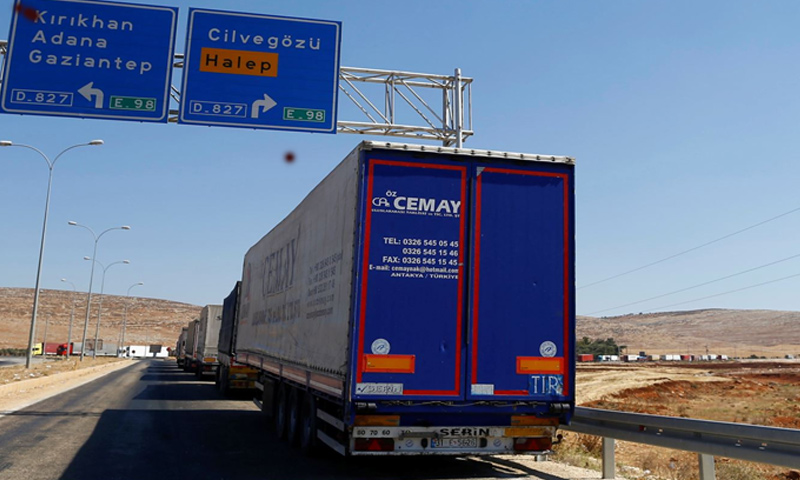Ambiguity continues surrounding the outcomes of the most recent session of Astana talks which were held last week, especially with regards to the opening of two strategic roads — the first being the Aleppo-Damascus road, and the second being the Aleppo-Gaziantep road into Turkey, which passes through areas in northern Aleppo that are under rebel control.
Leaks from the Astana talks, between guarantor nations in Syria (Russia, Turkey and Iran), show that questions surround how the roads would be secured and the extent of economic interest for the conflicting parties; whether it will be in the interest of the regime and the opposition or for Turkey, who is the administrating force in northern Syria.
There had been no official statements about this issue at the time this report was prepared, and there were also no movements on the ground.
The Aleppo-Damascus road has been closed since 2012 as a result of rebel groups taking over eastern Ghouta in Damascus and the Homs countryside, as well as sections of the road in Idleb and the Hama countryside.
The regime and Russia have tried repeatedly to open it through negotiations with rebel groups but to no avail. However, last month, Assad’s forces were able to open the road in Harasta north of Damascus and in the northern Homs countryside after rebel groups agreed to leave for northern Syria. Only a portion of the road now passes through opposition territories in Idleb, starting from the city of Morak in the northern Hama countryside. This section of the road will be patrolled by Russia, Turkey and Iran and ten kilometers on each side of the road will be fully secured according to Ibrahim al-Idlebi, a military adviser in the Free Syrian Army.
The highway is a major strategic route that connects the political capital, Damascus, and the country’s southern region to the north and the economic capital, Aleppo. Its restoration would have economic benefits for the Syrian regime, in addition to the major benefits that it would have for citizens in that it would reduce the price of foodstuffs and goods because of the ease of transporting them between Damascus and Aleppo. Previously they had been arriving on the unsafe Athriya-Khanaser road which required more time and led to higher prices for goods.
The second route which has been discussed is the Aleppo-Gaziantep road which passes from Aleppo into the northern countryside of Afrin province, which is controlled by rebel groups backed by Turkey, following Operation Olive Branch, then reaches Azaz and from there goes into Turkey through the Bab al-Salama border crossing.
If there is an agreement to open the road, Turkey will be responsible for securing it from their borders, passing through the opposition areas and up to the al-Lermoun roundabout area north of Aleppo, before Russian police take on the task of monitoring it inside the city.
A researcher at the Syrian Economic Forum, Melham Jazmati, told Enab Baladi that the strategic road was an essential artery for commercial traffic between Syria and Turkey before the revolution, especially after the free trade agreement between the two countries in 2004, which allowed for goods to flow in both directions and established joint projects. Additionally, there were agreements between Aleppo and Gaziantep traders and at a meeting in 2009 they announced their intention to achieve five billion dollars worth of trade between the two countries.
Jazmati believes that opening the road will have benefits for opposition areas in the northern Aleppo countryside and for regime areas because of the flourishing of trade and the legal entry of Turkish goods.
However at the same time, he said that there were important steps that needed to be taken before opening the road, which was opening the roads between Turkey and opposition areas in the northern Aleppo countryside, because there were still difficulties in bringing goods to the northern countryside and Syrian traders in Turkey accessing it.
Turkish-Russian agreement, not Turkish-Syrian
Discussions on opening the road are not limited to its economic importance. Analysts say that opening the road is a new stage in the restoration of relations between Syria and Turkey.
A member of the board of directors of the regime’s Economists Syndicate in the Aleppo countryside, Mohamed Bakour, said that the road would pave the way for the restoration of Syrian-Turkish economic relations, and pointed to the international desire to activate the international trade route from Syria. In this case more than one country who has an interest in marketing through Syria to other countries will benefit.
But the economic benefit would be bigger for Turkey than Syria, according to Jazmati, because Syria does not export anything to Turkey because of its lack of production, which has turned the country into a consumer of goods and not a producer. Therefore the biggest beneficiaries will be traders who are exporting to Syria and sending their goods to regime areas.
The regime’s benefit will only be moral, according to Jazmati, as its supporters will see the opening of the roads as a victory while the agreement is actually a Turkish-Russian agreement and not Turkish-Syrian agreement.
This article was translated and edited by The Syrian Observer. Responsibility for the information and views set out in this article lies entirely with the author.


